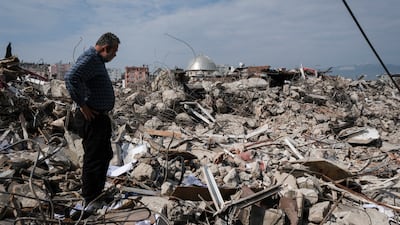Turkey's reconstruction and recovery costs may exceed $68 billion as a result of this month's earthquake disaster, which killed about 50,000 people and damaged more than 105,000 buildings, the World Bank has said.
The country sustained an estimated $34.2 billion in direct physical damages from the February 6 disaster, equivalent to about 4 per cent of its 2021 gross domestic product, the Washington-based lender said in its 50-page rapid damage assessment report.
The damage estimation does not represent the approximate cost of indirect or secondary impacts on Turkey’s economy and is not an estimate of the impact on the growth of its economy, it said.
GDP losses associated with economic disruptions will also add to the cost and further aftershocks are expected to increase the damage estimate over time, the lender said.
Economic damages are estimated in excess of $20 billion by Verisk while JP Morgan put the cost at about $25 billion and Karen Clark and Company's estimate is about $20 billion.
The Turkish Enterprise and Business Confederation has published an estimate of $84 billion, based on a comparison with the country's 1999 earthquake in Izmit.
Turkey was hit by 7.8 and 7.5-magnitude earthquakes on February 6, followed by more than 7,500 aftershocks and two additional quakes, inflicting the largest disaster on the country in more than 80 years.
The World Bank said the 11 provinces in the southern part of the country have some of the highest poverty rates in Turkey and host more than 1.7 million Syrian refugees, which is about half the total Syrian refugee population there.
The most extensive damage to buildings and infrastructure occurred in the Hatay, Kahramanmaraş, Gaziantep, Malatya and Adıyaman provinces, which together account for 81 per cent of the estimated damages and are home to about 6.45 million people, about 7.4 per cent of the country's population.
“This disaster serves as a reminder of Türkiye’s high risk to earthquakes and of the need to enhance resilience in public and private infrastructure,” said Humberto Lopez, World Bank country director for Turkey.
Lands cracked by earthquake in Turkey — in pictures
“As a leader in disaster risk management, the World Bank is committed to accompany Türkiye in its efforts to a disaster-resilient economic recovery.”
About 1.25 million people are temporarily homeless due to the moderate to severe damage to buildings or their complete collapse.
Direct damages to residential buildings account for 53 per cent ($18 billion) of the total damage, with 28 per cent of damage ($9.7 billion) in non-residential buildings and 19 per cent of damage ($6.4 billion) related to infrastructure.
The World Bank attributed the significant damage in buildings and infrastructure across southern Turkey to the two very large and shallow earthquakes that were back to back, in addition to thousands of aftershocks that were as high as 6.7 in magnitude.
“Early anecdotal evidence seems to suggest that a high proportion of the affected buildings were constructed prior to 2000, which is when the 1997 building code is seen to have been regularly implemented in construction,” the lender said.
The “potential lack of code compliance, which refers to buildings not being designed, built and inspected in accordance with Türkiye seismic building codes”, also was a factor in the severity of the damage inflicted by the earthquakes, it said.
“Lack of recent major seismic events in the region may have reduced awareness on how to prepare for and respond to major earthquakes. With the exception of smaller events, such as the 2020 Elazig earthquake [magnitude-6.8], the last major quake of similar magnitude was in 1822, around Hatay,” it said.
The World Bank, which on February 9 said it was providing $1.78 billion to assist relief and recovery efforts in Turkey, said assessments are still continuing.
Given the continued uncertainty and aftershocks, such as the 6.3-magnitude quake on February 20, 2023, in Hatay province, damage estimates may increase further, it said.















